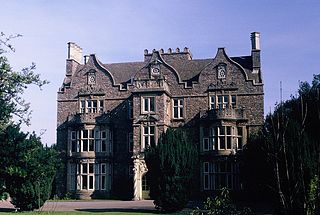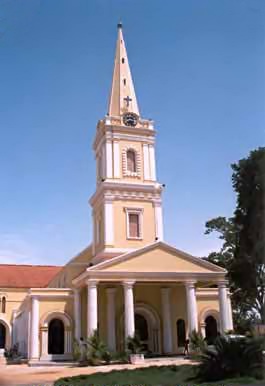Related Research Articles

James Hannington was an English Anglican missionary and martyr. He was the first Anglican bishop of East Africa.

Trinity College, Bristol is an evangelical Anglican theological college located in Stoke Bishop, Bristol, England. It offers a range of full-time and part-time taught undergraduate and postgraduate courses which are validated by the University of Durham through the Common Awards Scheme, though the college sets its own curriculum. Many of its students are training for ordination in the Church of England; and hence there is a strong vocational aspect to the courses it provides. It also has students of other Christian denominations, as well as students who are intending to serve within various forms of lay ministry. The college also has a significant number of students studying for research degrees at masters and doctoral levels. All of Trinity's postgraduate research courses are validated by the University of Aberdeen.

Johann Ludwig Krapf was a German missionary in East Africa, as well as an explorer, linguist, and traveler. Krapf played an important role in exploring East Africa with Johannes Rebmann. They were the first Europeans to see Mount Kenya with the help of Akamba who dwelled at its slopes and Kilimanjaro. Ludwig Krapf visited Ukambani, the homeland of the Kamba people, in 1849 and again in 1850. He successfully translated the New Testament to the Kamba language. Krapf also played a key role in exploring the East African coastline, especially in Mombasa.

The Church of Uganda is a member province of the Anglican Communion. Currently there are 37 dioceses which make up the Church of Uganda, each headed by a bishop.

St Mary le Port is a ruined parish church in the centre of Bristol, England, situated in Castle Park on what remains of Mary le Port Street.

The Karamoja sub-region, commonly known as Karamoja, is a region in Uganda. It covers an area of 27,528km and comprises the Kotido District, Kaabong District, Karenga District, Nabilatuk District, Abim District, Moroto District, Napak District, Amudat District and Nakapiripirit District. The region is projected to have a population of 1.4 millions in 2022 by UBOS.
The Church Mission Society (CMS), formerly known as the Church Missionary Society, is a British Anglican mission society working with Christians around the world. Founded in 1799, CMS has attracted over nine thousand men and women to serve as mission partners during its 200-year history. The society has also given its name "CMS" to a number of daughter organisations around the world, including Australia and New Zealand, which have now become independent.

The Church of the Province of Myanmar in Asia is a member church of the Anglican Communion. The province comprises the entire country of Myanmar. The current archbishop of Myanmar and bishop of Yangon is Stephen Than Myint Oo.
Characteristic of Christianity in the 19th century were evangelical revivals in some largely Protestant countries and later the effects of modern biblical scholarship on the churches. Liberal or modernist theology was one consequence of this. In Europe, the Roman Catholic Church strongly opposed liberalism and culture wars launched in Germany, Italy, Belgium and France. It strongly emphasized personal piety. In Europe there was a general move away from religious observance and belief in Christian teachings and a move towards secularism. In Protestantism, pietistic revivals were common.

Charles Theophilus Ewald Rhenius was a German-born missionary of the Church Mission Society (CMS). He was the first CMS missionary to arrive at India. For his missionary work in the Tirunelveli district he came to be known as the "Apostle of Tirunelveli". He was involved in the attempt to revise the Fabricius version of the Tamil Bible and also published a Tamil grammar book. Rhenius’ split from the Anglican Church in 1830 and started his own congregation. Rhenius' work was recognized in 1980 by the Reverend Daniel Abraham, the then Church of South India (CSI) bishop of Tirunelveli diocese. Rhenius's work was given official recognition by the Anglican Communion during the Tirunelveli diocese bicentenary celebration in 1980, in which, all the bishops, including Anglican bishop Stephen Neill and all the presbyters took an oath in front of the tomb of Rev Rhenius to follow the path of the resting soul, regard to evangelism.

Leonard William Chapple Sharland LTh MA (1904–1978) was a pioneer missionary amongst the Dinka people with the Gordon Memorial Mission of the Church Missionary Society (CMS) in southern Sudan in the middle of the 20th century.
Karl Wilhelm Isenberg, spelt or known by names Carl Wilhelm Isenberg or Charles William Isenberg or C. W. Isenberg or Carl W. Isenberg or Charles Isenberg, was a German Church Missionary Society missionary and linguist to East Africa and Western India.

Evangelical Anglicanism or evangelical Episcopalianism is a tradition or church party within Anglicanism that shares affinity with broader evangelicalism. Evangelical Anglicans share with other evangelicals the attributes of "conversionism, activism, biblicism and crucicentrism" identified by historian David Bebbington as central to evangelical identity. The emergence of evangelical churchmanship can be traced back to the First Great Awakening in America and the Evangelical Revival in Britain in the 18th century. In the 20th century, prominent figures have included John Stott and J. I. Packer.
John Martin Ball was a British Anglican bishop. He was Assistant Bishop of Central Tanganyika in the Anglican Church of Tanzania, and retired to the Church of England.

The Church Missionary Society in the Middle East and North Africa, operated through branch organisations, such as the Mediterranean Mission, with the mission extending to Palestine, Iran (Persia), Iraq, Egypt, Ethiopia (Abyssinia) and the Sudan. The missions were financed by the CMS with the local organisation of a mission usually being under the oversight of the Bishop of the Anglican diocese in which the CMS mission operated. The CMS made an important contribution to the Episcopal Church in Jerusalem and the Middle East.
John Edward Church, commonly referred to as Joe Church, was a British missionary who served with Church Mission Society (CMS). Dr. Church served primarily in Rwanda and Uganda. He left England in 1927 and served as a missionary for 44 years, alternating between medical and evangelistic missions. He is widely known for playing a key role in the East African Revival. Additionally he served as a doctor in Rwanda for over a decade and constructed hospitals and a church. He has been recognized for his work by governments in East Africa and Europe.
Henry Graham served as a missionary to Sierra Leone, Africa with the Church Missionary Society from 1829 to 1832. Graham served as the first medical missionary within the Church Missionary Society, one of the largest organizers of mission trips at the time. As such, Graham was a trailblazer in the role and worked to find appropriate balance between medical and religious duties and values in missionary service.
Cathy Ross is a New Zealand-born academic and scholar of missiology. She leads the Pioneer Mission Leadership Training centre of the Church Mission Society, in Oxford, England. She is also canon theologian at Leicester Cathedral. She is the author of Women with a Mission: Rediscovering Missionary Wives in Early New Zealand.

The history of Anglicanism in Sichuan began in 1887 when Anglican missionaries working with the China Inland Mission began to arrive from the United Kingdom. These were later joined by missionaries from the Church Missionary Society and Bible Churchmen's Missionary Society. Or according to Annals of Religion in Mianyang, in 1885, a small mission church was already founded in Mianyang by Alfred Arthur Phillips and Gertrude Emma Wells of the Church Missionary Society. Missionaries built churches, founded schools, and distributed Chinese translations of Anglican religious texts. These efforts were relatively successful and Anglicanism grew to become one of the two largest denominations of Protestant Christianity in the province, alongside Methodism.

Eugene Stock (1836–1928), was an English author, historian, journal editor and senior editorial secretary at the Church Missionary Society in London. Widely regarded as an authority among his contemporaries, Stock is best known for his four-volume work, The History of the Church Missionary Society , published in 1899, which is considered the most thorough account on the history of the Church Missionary Society (CMS) and the many missions it had reign over. Because of his extensive knowledge of CMS history, Stock became the senior secretary of the society. He also lectured to women at missionary meeting places in London, and promoted the idea of recruiting women for missionary service.
References
- Purser, Alan (2007), The Story of the Society (PDF), Crosslinks, archived from the original (PDF) on 25 July 2011
- Hooton, W. S.; Wright, J. Stafford (2007), The First Twenty-five Years of the Bible Churchmen's Missionary Society, London: Bible Churchmen's Missionary Society.
- Russell, Stanley Farrant (1972), Full Fifty Years: the BCMS story, London: Patmos Press.